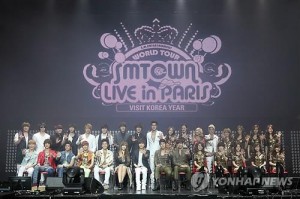In the wake of SM Entertainment’s quite successful concerts in Paris, the BBC has come out with another takedown of the K-pop industry, ominously titled THE DARK SIDE OF SOUTH KOREAN POP MUSIC. And for the most part, Lucy Williamson’s story is quite good. The story does not really break new ground, except for getting the members of the K-pop group group Rainbow to complain about their low wages on the record, but it is still worth a read.
Some highlights:
But the industry also has a less glamorous side: a history of controversy and legal disputes over the way it treats its young artists, which it is still struggling to shake.
That is, I think, a fair thesis. It says that there has been trouble, but the industry is trying to get past it. The courts have sided with the artists on several big cases involving unfair contracts and the Fair Trade Commission has tried to create better ones for the industry. But, as one lawyer notes:
“Until now, there hasn’t been much of a culture of hard negotiation in Asia, especially if you’re new to the industry,” says Sang-hyuk Im, an entertainment lawyer who represents both music companies and artists.
Attitudes are changing, he says, but there are some things that even new contracts and new attitudes cannot fix.
Williamson’s story mentions an artist union, but does not follow up the thought. It seems to me that if the performers were willing to get together, they could change the industry pretty radically overnight. After all, if management insists on treating pop music like a factory, it makes sense that the workers and apprentices treat it like a factory, too. And with so few workers earning 90 percent of the revenues, the top 10-20 groups and artists could potentially have a huge say. But, given the background of most artists and the structure of the biz, that is just not going to happen.
Contrary to some opinions, pop music has been a big part of the Korean music scene for years. In fact, there was probably a lot more diversity in the Korean music scene back in the 1970s, when you had trot, rock, folk, and pop, all with significant followings. Of course, money was tight back then, the recording technology generally was not great, and you did not have the elaborate pop culture industry to mold and perfect pop stars.
But even back in the 1970s, you could see many similarities to the music industry today. Back then, you had a small number of labels controlling access to studios and the airwaves. Also at the time, you had artists complaining that they did not make any money from their recordings, with the bulk of their revenues coming from concerts. And you had artists like the Hee Sisters or Lee Myoung-hoon (of Fevers) who were at least as famous for their looks and dancing as their music.
(Luckily, there is a book on its way all about the history of Korean rock and pop music from that period. I hope to be able to mention more about it soon.)
So, if the problems with Korean pop go back decades, to pop music’s origins in the 1970s, what can be done to fix things now? To be honest, I am not sure. With all respect to Bernie Cho (the head of the digital distributor DFSB Kollective, who is quoted in the BBC article), I do not think undervalued digital sales has much to do with the problem, and is probably more a symptom than a cause.
I suspect that this is another issue that internationalization is going to help with. As Korean artists get out and play other countries more, working with global artists, they are going to discover other ways of doing things. Not only are Korean artists getting out more, but international music labels, like Universal Music Group, are coming into Korea, working with the Korean companies in a variety of ways.
Despite the best intentions of government officials (and, often, their less-than-best intentions), learning by example is far more powerful than government directives. Look at Korea’s movie industry, which was helped far more by creators studying and working abroad than it was by the Ministry of Culture or Korean Film Council.
The question is, as always, will the industry be able to get its act together in time, before the next, hungrier competitor comes along? I do not think K-pop is in danger of disappearing, but people and the media are always on the lookout for the next big thing. The world today is full of music producers and performers who are studying the Korean example, looking to take it to the next level. After all, improving conditions for K-pop’s artists is not just about making the stars rich, it is about making the entire industry healthier.






“Williamson’s story mentions an artist union, but does not follow up the thought. It seems to me that if the performers were willing to get together, they could change the industry pretty radically overnight. After all, if management insists on treating pop music like a factory, it makes sense that the workers and apprentices treat it like a factory, too. And with so few workers earning 90 percent of the revenues, the top 10-20 groups and artists could potentially have a huge say.”
I think you hit the nail right here.
As a labour rights specialist, the first thing that struck me about the Korean pop music industry is its horribly unbalanced labour market, which then can only lead to horribly unhealthy labour relations. While the management companies and distributors are freely allowed to organise themselves and their cartels (KEPA, KFPCAI, KMP Holdings, etc.) are implicitly tolerated by the Korean government, the artists themselves are not only actively discouraged from forming or joining unions but are themselves afraid to do so (especially the underage “idols”).
As a result, more and more consumers are organising themselves to make up for the lack of organisation among artists for the protection of their own rights. But this also, I would say, is not ideal…
I thoroughly enjoyed your first book and would find it interesting if you had a go at pursuing this aspect of the Korean cultural contents market in your next one ^^.
Thinking how thing haven’t changed in 30 years is disheartening and worrisome.
May be the world interest in the Korean Wave will bring some hope to the entertainment industry in Korea.